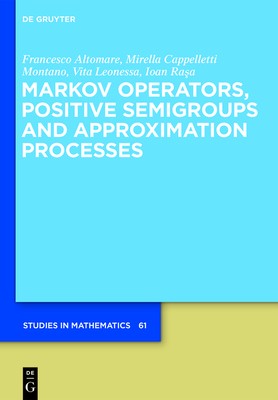
- We will send in 10–14 business days.
- Author: Francesco Altomare
- Publisher: De Gruyter
- Year: 2014
- Pages: 325
- ISBN-10: 3110372746
- ISBN-13: 9783110372748
- Format: 17 x 24.4 x 1.9 cm, hardcover
- Language: English
- SAVE -10% with code: EXTRA
Markov Operators, Positive Semigroups and Approximation Processes (e-book) (used book) | bookbook.eu
Reviews
Description
This research monograph gives a detailed account of a theory which is mainly concerned with certain classes of degenerate differential operators, Markov semigroups and approximation processes. These mathematical objects are generated by arbitrary Markov operators acting on spaces of continuous functions defined on compact convex sets; the study of the interrelations between them constitutes one of the distinguishing features of the book.
Among other things, this theory provides useful tools for studying large classes of initial-boundary value evolution problems, the main aim being to obtain a constructive approximation to the associated positive C0-semigroups by means of iterates of suitable positive approximating operators. As a consequence, a qualitative analysis of the solutions to the evolution problems can be efficiently developed.
The book is mainly addressed to research mathematicians interested in modern approximation theory by positive linear operators and/or in the theory of positive C0-semigroups of operators and evolution equations. It could also serve as a textbook for a graduate level course.
EXTRA 10 % discount with code: EXTRA
The promotion ends in 17d.01:48:50
The discount code is valid when purchasing from 10 €. Discounts do not stack.
- Author: Francesco Altomare
- Publisher: De Gruyter
- Year: 2014
- Pages: 325
- ISBN-10: 3110372746
- ISBN-13: 9783110372748
- Format: 17 x 24.4 x 1.9 cm, hardcover
- Language: English English
This research monograph gives a detailed account of a theory which is mainly concerned with certain classes of degenerate differential operators, Markov semigroups and approximation processes. These mathematical objects are generated by arbitrary Markov operators acting on spaces of continuous functions defined on compact convex sets; the study of the interrelations between them constitutes one of the distinguishing features of the book.
Among other things, this theory provides useful tools for studying large classes of initial-boundary value evolution problems, the main aim being to obtain a constructive approximation to the associated positive C0-semigroups by means of iterates of suitable positive approximating operators. As a consequence, a qualitative analysis of the solutions to the evolution problems can be efficiently developed.
The book is mainly addressed to research mathematicians interested in modern approximation theory by positive linear operators and/or in the theory of positive C0-semigroups of operators and evolution equations. It could also serve as a textbook for a graduate level course.


Reviews